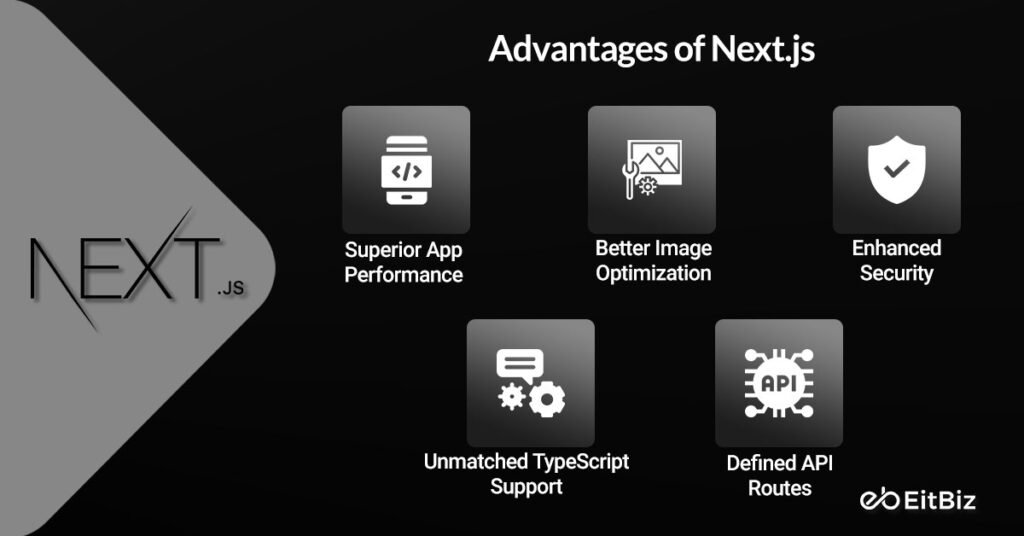If your app development decision boils down to the confusion between Next.js vs. Node.js then you’re on the right road to building the “GOAT” app of all time!
But why so?
Both these JavaScript tools are not just prevalent but they also facilitate streamlined app development.
Speaking of Next.js and Node.js functionality, they both are diverse and serve different purposes. The former is a framework that builds server-rendered applications. The latter, on the other hand, is a JavaScript runtime environment that executes JavaScript on a particular platform.
Did you know?
According to multiple researches, nearly 2% of websites worldwide use Node JS while Next.js has started gaining traction and is expected to boom.
Considering such astonishing facts, it’s not a shame to get confused. Excited to know Nextjs vs. NodeJS js, which is better? Let’s dig down deep!
Understanding Next.js
Built on React, Next.js development is a seamlessly powerful framework designed for building server-side static apps and websites in React Chat SDK. This open-source framework integrates easily with React which enables developers to focus on the front-end logic. Infused with abundant features like preview mode, static export, rapid complication, and automatic optimization, Next.js has all that a good app development seeks.
In Next.js, server-side rendering (SSR) means that web pages are generated on the server and then sent to the client. Thus, it leads to faster app loading and unmatched SEO capabilities.
Furthermore, the framework supports SSG (Static Site Generation) that enables pre-rendering your entire app. Not only does it improve the app’s performance but also eliminates monotonous round trips to the backend.
Though NextJS app development seems to be an excellent choice, it’s good to explore its untapped advantages.
Without further ado, let’s dive in!
Advantages of Next.js for Building High-End Business Apps

Fortified with convention and tested practices, Next.js app development indeed helps developers build faster and more efficient web apps. This brings us to the salient benefits & features of Next.js for building web apps.
Benefit #1: Superior App Performance
Since Next.js is equipped with abundant functionalities like SSG, SSR, and automatic code splitting, it’s no wonder why these apps are blazing fast. With these features, you can rest assured that your app’s pages will load quickly while fostering a smooth user experience.
Benefit #2: Better Image Optimization
Next.js is prone to get updates from time to time. Thus, its latest version provides the feature of automatic image optimization API that optimizes images anywhere on the internet. The framework has a next/image component that significantly enhances image delivery and performance metrics.
Benefit #3: Enhanced Security
This popular framework supports Static Site Generation (SSG) which helps improve the security of web applications. Since the content is already generated and treated as static HTML files, it reduces the risk of potential security breaches. Furthermore, there’s always consistent support from active communities towards enhanced performance and security over time.
Benefit #4: Unmatched TypeScript Support
Next.js supports TypeScript which allows developers to write code in a safe environment, leaving no room for errors. Moreover, such excellent support enables code developers to identify problems early and enhance code maintainability. Its React-based architecture makes it hassle-free for developers to improve the scalability of your app’s code.
Benefit #5: Defined API Routes
Another mainstream feature of Next.js is that it enables developers to create API routes. Thus, it assists them in building back-end functionality within the same project to minimize overhead expenses and streamline deployment. While building the app’s pages, try to define API routes to reap maximum benefit.
List of Companies Built Apps Using Next.js
- Binance
- Hulu
- Twitch
- TikTok
- Nike
- JobTatkal
After understanding all these Next.js app development benefits, it’s no surprise that it’s gaining momentum among businesses!

But wait!
Let’s not forget Node.js! To gain the right knowledge about the difference between Next.js vs. Node.js, let’s understand the latter in detail.
Node.js: What is it?
It is a JavaScript runtime environment that helps build data-centric apps for all operating systems, including Windows, Linux, and Unix. Built on the V8 JavaScript engine and single-threaded model, it builds fast and scalable web apps while it can handle multiple connections without multi-threaded servers.
Note: Node.js is a comprehensive Stack environment and is referred to as run time. It is neither a framework nor a language.
Its non-blocking IO model and even-driven architecture make it a preferred choice for building stunning and scalable apps. It means that it can handle multiple requests without blocking the functioning of other tasks. Furthermore, its wide gamut of libraries makes the app development process faster and more streamlined. Be it handling HTTP requests or implementing security measures, Node.js app development has got your back!
Speaking of its popularity, more than 36% of professional app developers prefer Node.js for building and maintaining their apps
With such growing demand for Node.js, it’s viable to look at its potential advantages!
Salient Advantages of Choosing Node.js for App Development

Here are the key features and benefits of Node.js for your app development project.
Benefit #1: Inclusion of Modular Design
Since Node.js is equipped with a modular design, it allows developers to reuse and share the code without rewriting it. This, in turn, helps experts to develop and maintain large-scale apps while facilitating faster time to market. Furthermore, it has a built-in package manager, i.e., NPM that helps break down code into smaller bits to improve the UI/UX process.
Benefit #2: Includes Debugging Tools
Infused with built-in debugging tools namely “Interactive debugger” and “Support for Console Logging”, Node.js has the advantage of identifying and fixing potential code issues. Additionally, it allows you to use JavaScript for both frontend and backend which facilitates a peerless app development experience.
Benefit #3: Robust Community Support
Node.js has a large community of developers that contribute to a vast ecosystem of libraries via the Node Package Manager (NPM). Furthermore, there are many tutorials, guides, and documentation available on the community forum where developers can resolve their queries. With a wide range of tools and libraries available, it is easier to add new functionality to your app.
Benefit #4: Boost Productivity
This run-time environment supports asynchronous programming that enables developers to write responsive code. Also, this fast reuse of code can allow coders to handle multiple requests simultaneously. Thus, it results in faster development of the app while preserving the required resources.
Benefit #5: Performance-Oriented Frameworks Available
Since Node.js has multiple strong frameworks, including Koa, Express, Hapi, Meteor, and Nest JS, it allows developers to make app development a breeze. Moreover, there are advanced tools available for creating server apps and APIs.
Companies Built Apps Using Node.js
- Netflix
- Paypal
- Medium
- Walmart
- Uber
What are the Node.js and Next.js Differences Based on Multiple Parameters?
Speaking of node.js and next.js difference, the former is a runtime that enables developers to use JavaScript on the server while the latter offers the building blocks to create web applications and manage complex front-end aspects of the app.
Still confused about which tech to choose for app development? If so, don’t worry! Let’s take a quick look at the node.js and next.js differences.
| Parameters | Next.js | Node.js |
| Performance | Though Next.js can improve the performance of the app, its SSR may have an impact on the server. | Node.js, on the other hand, is known for its blazing-fast app performance. |
| Scalability | Next.js development is also performance-oriented but its scalability may be impacted by server hardware and infrastructure. | It is incredibly scalable and can handle many connection requests with ease. |
| App Development Speed | Next.js supports built-in server-side rendering and automatic code splitting to speed up the development process. Though it is quick and has speedy development, it is complex to set up and configure. | Node.js, on the other hand, is known for its faster development times. Developers can easily build, test, and deploy the app. |
| Community Support | Even though it’s new, it has a large community of developers from React Native. There are plenty of resources available. | On the contrary, Node.js also has a strong community of developers wherein open-source libraries are freely available. |
| SEO Support | With Next.js, developers get built-in support for SSR & SSG which helps improve the SEO aspect of the app. | However, in the case of Node.js, SEO optimization needs the implementation of SSR & SSG which demands time and effort. |
| Code Splitting | In Next.js, there’s a support for automatic code splitting. | Node.js, on the other hand, enables developers to manually split the code which can be challenging. |
| Routing | When it comes to Next.js, fire-based routing is there where file structure defines the route. | Node.js requires an additional set of packages or frameworks for routing purposes. |
The Bottom Lines
That’s the wrap to the question Nextjs vs. NodeJS js, which is better? When it comes to building a solid app, both offer unmatched tools and solutions for diverse project needs. Each has its own unique traits and the choice between the two depends on your requirements.
To help you make the right decision, here’s a quick recap! Node.js is ideal for building scalable backend systems while Next.js delivers React Native web apps with Server-Side Rendering and Static Site Generation.
If you’re not sure what to choose, hire the Next.js/Node.js app development company to help you build scalable apps for your business. Our custom app development solutions build, test, and deploy Next.js and Node.js solutions that fuel your business growth.
Don’t let your business wait for its growth! Call EitBiz at +1(812)530-6300 or you can send us queries to info@eitbiz.com today!
Frequently Asked Questions
Listed below are the frequently asked questions related to the Next.js vs. Node.js.
- Can Next.js replace Node.js?
Next.js has its own development server and routing capabilities, but it’s not meant to replace Node.js.
- Should I learn Next.js or Node.js?
If you want to enter the world of development and find an easy way to create web pages, Next.js would be an ideal choice. On the other hand, if you are completely new and want to develop a foundation then Node.js would never disappoint you.
- Is Next.js for frontend or backend?
Next.js is great for making the front end of websites. It’s good at showing content quickly and it’s easy to use.
- Is Next.js for clients or servers?
Normally, Next.js uses Server Components. This makes it easy to show content quickly without needing extra setup. These components help build web apps in a new way, mixing server and client-side rendering.
- Is Node.js for frontend or backend?
Some people think Node.js is only for making servers, but that’s not true. Node.js can work on the front end and back end.
- When should Node.js be used?
Node.js is good for making single-page apps and websites that need to handle lots of requests at once. It can show content to users quickly, making their experience better.





